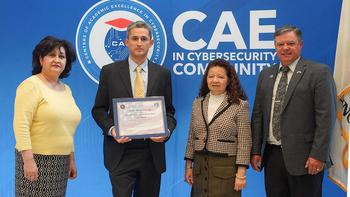George Mason University was recently redesignated by the National Security Agency (NSA) as a National Center of Academic Excellence (NCAE) in Cybersecurity. This recognition continues a designation that has been in place since 1999 and makes Mason’s College of Engineering and Computing eligible for special funding opportunities.
Mason was redesignated in two categories: Cyber Defense (CAE-CD), valid through 2027, and Research (CAE-R), valid through 2028. Mason is one of only seven schools that received a designation with the original cohort in 1999. The CAE in Cyber Defense is the longest-running designation of any program in the country.
NSA has curriculum requirements that a program must meet, involving a rigorous, peer-reviewed, multi-step application. Massimiliano (Max) Albanese, an associate professor and associate chair for research in the Department of Information Sciences and Technology and the associate director of the Center for Secure Information Systems, helps lead Mason’s efforts in securing the designation.
According to the CAE Community website, “The CAE in Cyber Research designation indicates that (an) institution increases the understanding of robust cyber defense technology, policy, and practices that will enable our Nation to prevent and respond to a catastrophic event. The CAE in Cyber Defense designation indicates that (an) institution is helping reduce threats to our national infrastructure by promoting higher education and research in cyber defense as well as provide the nation with a pipeline of qualified cybersecurity professionals.”

Albanese said, “To become eligible for the Cyber Defense designation, which is the education component of the NCAE program, a school has to have a validated program of study meeting NSA curriculum requirements; the one that allowed us to be eligible for the designation is our bachelor’s in information technology, with a concentration in cybersecurity.” To be eligible for the Research designation, a school must have a PhD program preparing students for research in cybersecurity, which at Mason is the PhD in information technology. Albanese added that the university is currently preparing an application to also validate the college’s master’s in applied information technology.
“In addition to the prestige,” Albanese said, “an advantage of the designation is that we have access to exclusive funding opportunities. We’ve been receiving funds for the Cyber Security Scholarship Program (CySP) for many years, for example, which covers tuition, health insurance for doctoral students, laptops, a stipend, and more.” The program brings roughly $150-$200k annually for Mason students. NSA funding that Mason receives for other cyber-based projects is also contingent on the school having the CAE designation.
Albanese said, “Mason’s NCAE designation isn’t just a badge of honor, it’s a testament to our commitment to excellence in cybersecurity education and research. Beyond the obvious financial benefits, being part of the CAE community is a catalyst for innovation and collaboration. The innovative Virginia Cyber Navigator Internship Program (VA-CNIP), managed by a coalition of NCAE-designated Virginia universities, is a prime example of how being part of this community translates into impactful initiatives and real-world experiences for our students.”
